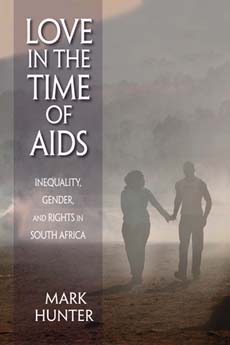
Dr Mark Hunter raised some complex questions around love and intimacy recently at a Critical Studies Seminar where he attributed the spread of HIV to the racialised inequalities stemming from apartheid; rising unemployment and social inequality; poor housing; low marriage rates and the increased movement of people away from rural areas.
Dr Hunter is an assistant professor of Geography and Social Sciences at the University of Toronto, Scarborough as well as a research associate at the School of Development Studies at the University of KwaZulu-Natal. In his book, Love in the time of Aids- inequality, gender and rights in South Africa (Indiana University Press/University of KwaZulu Natal Press 2010) he combines ethnography and history with over 300 formal interviews with the residents of Mandiniin KZN.
He stayed in the informal settlement for a year and a half in total, recording love letters, SMSes and speaking to people about intimacy, which he explains as “a broader term than sex that extends analysis into fertility, love, marriage and genital pleasure”.
Asking the overriding question: “How can a weak virus affect so many people in one country?” He described the relationship dynamics of the residents, pointing out how informal settlements have twice the rate of HIV than rural or urban communities.
Dr Hunter argued that sex and exchange are embedded in political, geographic and economic shifts. He describes this as “the dangerous entanglement of love, sex and gifts” and how it is not effective to apply Western modes of thought to understanding the complexities of such relationships.
In one vignette, he described Thandi, who has three men in her life who help her give her money for transport, food and airtime. Thandi is not a prostitute however, as there is some degree of ‘love’ involved.
Dr Hunter later likened it to how the primary lover can be seen as the pot and the secondary lover the lid. He says: “It’s the patterns of these relationships that creates a superhighway for the spread of HIV” especially in terms of re-infection.
In South Africa in the early 20th century, money, love and sex was institutionalised through ilobolo. At times money and sex can be seen as love. Yet in some cases money and sex are seen as opposite.
Dr Hunter argues that many studies disregard the complexity of the matter and the argument that it’s a matter of chauvinism is inadequate. “So when the question is, are you having sex for money, the answer is invariably no. The mode whereby knowledge leads to attitude and practise changes doesn’t work because intimacy is deeply embedded in people’s material lives and these haven’t changed dramatically since 1994.”
Having run out of time, Dr Hunter concluded: “Gender is at the heart of the Aids epidemic. What I would like to see is Aids embedded in policy in a creative way, for instance on a progressive policy for upgrading and not simply removing shacks from urban areas.” This is echoed in the first chapter of his book where he says: “The key question is not whether gender is central to understanding Aids but how the pandemic is gendered.”
Story by Anna-Karien Otto
